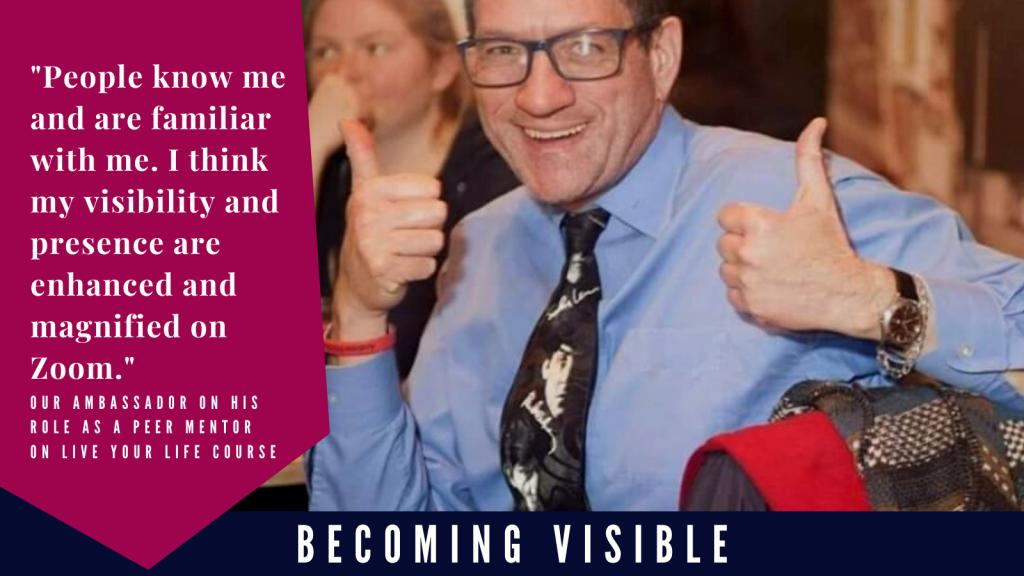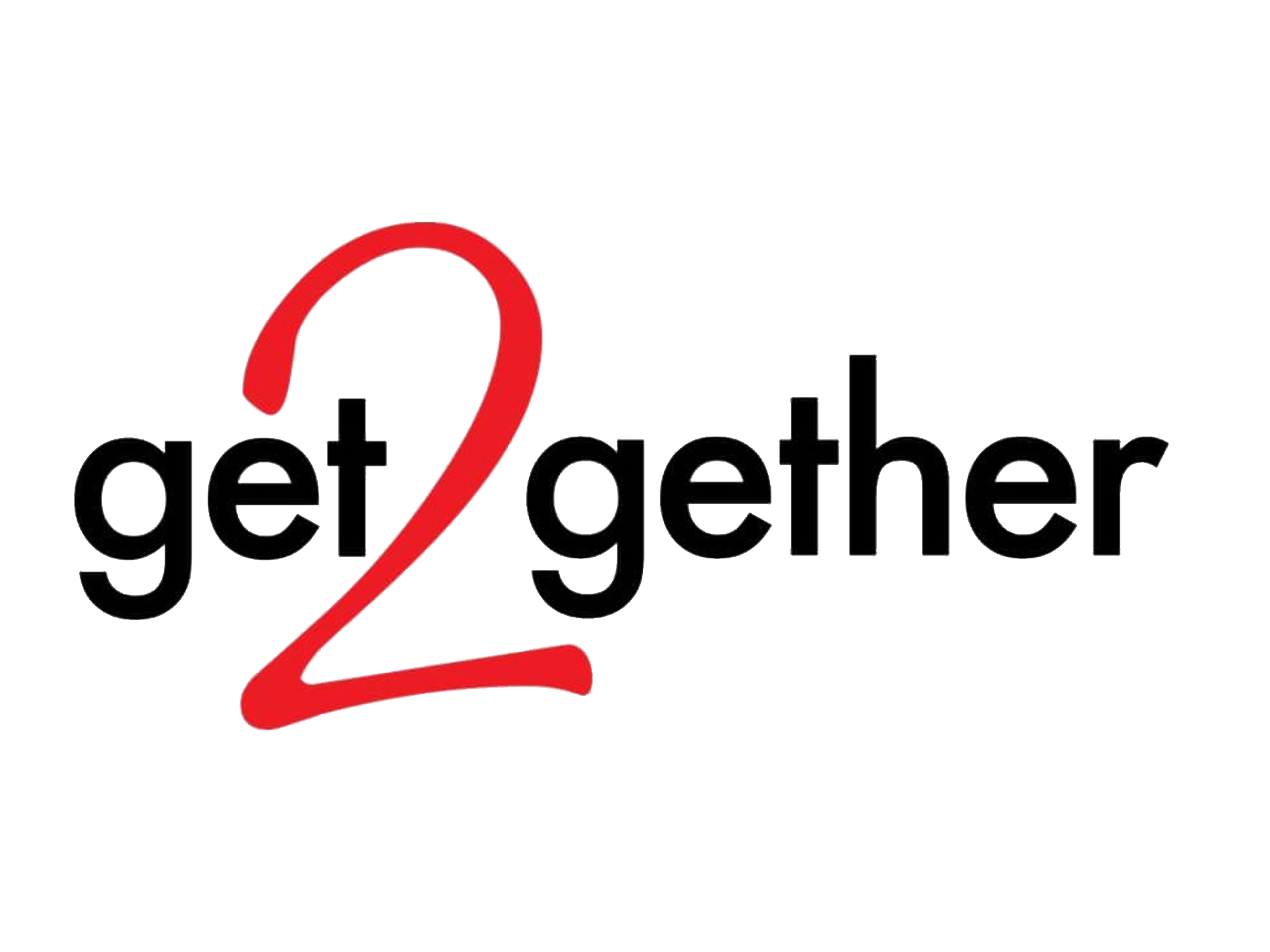Andrew is #BecomingVisible

Andrew is an Ambassador at get2gether. Every year, Andrew hosts over 24 social events for our members. Andrew won the Employee Recognition category at the Scottish Learning Disability Awards in 2020.
As part of his role, Andrew also works as a Peer Mentor on the Live Your Life course. He facilitates relaxation at the beginning of each session and facilitates some of the activities and conversations. In this blog, Andrew speaks about this role.
The #BecomingVisible blogs this week will explore the importance of Peer Support on the Live Your Life course as well as the positive impact of participants supporting each other.
What qualities do you have that make you a good Peer Mentor on the Live Your Life course?
I have been a Peer Mentor many times. Each time I pick up different lessons and put them into action in my life. A strength is that I am able to share my experiences with the group.
I have also learned how to use my visibility to help members open up with answers. My presence is more enhanced on Zoom. It’s more personal and direct. I use this to place emphasis on questions.
Another strength is that I like to make people feel welcome. A simple sentence, but I feel to make people feel welcome and relaxed can only be a good thing. It makes it a place where they want to be.
What do you do as a Peer Mentor on Zoom and how is it different to being a Peer Mentor in person?
I like to think I make people feel relaxed on Zoom and in person. I like to think people are happy to see me. My relaxation at the start slows people down and gets them ready for the afternoon.
I listen, ask constructive questions and draw conversations out of people.
The difference from being a Peer Mentor on Zoom to in person is that lessons feel more direct, but not in a forced way. Questions are more direct. More work gets done in an hour on Zoom than an hour in person I think.
Also there is a cloak of what is said in the Zoom stays in the Zoom which is true. It’s easier for members to open up more I feel.
I think both ways have value.
How do you make people feel welcome on Zoom?
Feeling relaxed and safe is important. I bring humour and a wee bit of silliness, but I also care for our members as they grow. I can show positive feelings for them. I like to think that the good feeling I get from our members is what they get from me too.
What have you learned about yourself from being a Peer Mentor?
I have learned that I can cope with a mood altering disability. I have learned many life lessons and have learned that I am able to use them in my life. For example I have learned that when you are angry you can see the world as just right or wrong, and that the world is not like that, but I can control this by being aware of it.
I have also learned that I can have meaningful conversations with members by asking questions that are not just yes or no questions. This has improved my relationships with my partner, family and friends.
Why do you think it is important to have Peer Mentors on the course?
I think it is important to have Peer Mentors on the course because it brings a type of relaxed feeling. People know me and are familiar with me. I think my visibility and presence is enhanced and magnified on Zoom – when I speak, everyone looks at the wee square. Some members have met me in person or at events so are more willing to open up and learn because I am there supporting them.
The Live Your Life course is different online, but it’s a good kind of different. I am more visible. It’s a challenge I feel we have overcome and the next Live Your Life course is now being organised.
What does #BecomingVisible mean to you?
It means so much, to be able to put a face to what would otherwise be just a name on paper. It’s the personal touch, the laughter, the lightheartedness. I think it’s harder to feel connected to a name or just a voice on a phone.
Being visible means better connection and communication. I honestly feel you get to know the person better when you are in person, and to some extent Zoom is in person. The bond is stronger when the name has a face.
Being visible as a peer mentor has many positives.
The Live Your Life course was developed with the Thistle Foundation initially as a way of adapting their Lifestyle Management course to make it accessible for all adults with learning disabilities. Since the pilot, the course has gone through significant changes, but it continues to use the tried and tested methodologies of Solution Focused Therapy, Person Centred Planning and Lifestyle Management.
“If you want a way to listen more, act calmer, be more assertive, it’s a bundle of good tips.” (Course Participant)
During lockdown, as with all get2gether activities, the course moved online. A happy outcome of this was that the course is now much more accessible for those who find it hard to travel, or who would need support to travel.
“I don’t think I would have done this course if it wasn’t online – I struggle to get out. I found it very rewarding” (Course Participant)
Across the 12 weeks, the course covers topics such as positivity, managing stress, understanding other people’s perspectives, listening, assertiveness, and managing emotions. It also holds a significant amount of time for participants to think about what they want from their own life, with a focus on participants learning how to support each other to reflect on this.
“The course gently redefined my priorities. I am now saying yes to what I want to do and no to other things.” (Course Participant)
People come on the course for many different reasons: stress and anxiety; to learn how to manage their emotions better; to gain confidence; because of frustrations in life. Whatever the reason though, one thing that is often reported in the evaluation is the positive impact of the others on the course, including the Peer Mentors. Being able to learn together, to discuss ideas with the group and to support each other has a much deeper impact on individual understanding and personal development.
“I liked that it was my peer group. I learned a lot about my peers and learned that I am not alone.” (Course Participant)
